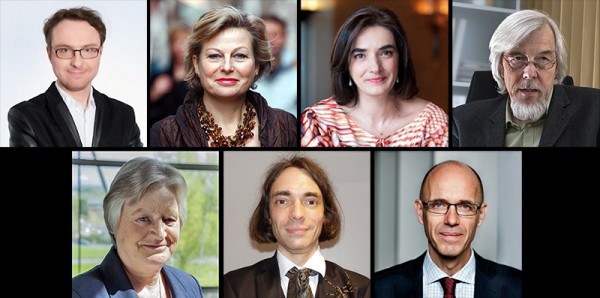12-11-2015
SCIENCEINSIDER

BRUSSELS—Seven scientists, including a Fields medalist and the director of CERN, Europe's premier particle physics lab, have been appointed today to provide the European Commission with policy advice—bringing an end to a year of suspense since the awkward exit of Anne Glover, the first and only chief scientific adviser (CSA) in the commission's history.
The high-level group is part of a larger setup, called the Scientific Advice Mechanism (SAM), that replaces the controversial single-headed adviser role—which ended just 3 years after the previous administration created it.
The new group includes four men and three women from seven different countries and seven disciplines. They will not be employed by the commission and will keep their current jobs. They are:
∙ Polish bioinformatician Janusz Bujnicki, who leads a lab at the International Institute of Molecular and Cell Biology in Warsaw and serves on a scientific policy committee that advises Poland's science ministry;
∙ Dutch sociologist Pearl Dykstra from Erasmus University in Rotterdam, the Netherlands, who has been vice president of the Royal Netherlands Academy of Arts and Sciences since 2011;
∙ Portuguese materials scientist Elvira Fortunato from the Universidade Nova de Lisboa in Portugal, who listed 57 patents, submitted in her name in 2012;
∙ German physicist and CERN Director Rolf-Dieter Heuer;
∙ British climate researcher Julia Slingo, the chief scientist of the United Kingdom's Met Office, which provides weather and climate change forecasts;
∙ French mathematician and Fields medalist Cédric Villani, who heads the Henri Poincaré Institute in Paris;
∙ Danish microbiologist Henrik Wegener, chief academic officer and provost of the Technical University of Denmark in Lyngby, who has expertise in food safety, zoonoses, and policy advice.
“This looks like a good group,” says Glover, who points out that she appointed Villani to theformer President's Science and Technology Advisory Council during her CSA term in 2013. “They have scientific credibility as well as a deep knowledge of the ways in which scientific evidence can be used to inform policy as well as the world of politics,” Glover adds.
The seven will hold their first meeting in January but the topics on their plate are yet to be decided. Research commissioner Carlos Moedas told ScienceInsider they will focus on a mixture of urgent matters dictated by current events—one example in the past year was the Ebola outbreak in West Africa; medium-term topics relevant to the commission's policy work program; and long-term subjects that the group's scientists can also choose themselves.
Moedas says the demand for advice will come not just from his own directorate but from his fellow commissioners as well, with Moedas serving as the liaison between the group and the college of commissioners, which meets every week in Brussels.
In a piece in the U.K. daily The Guardian, James Wilsdon from the Science Policy Research Unit at the University of Sussex in the United Kingdom wonders how the group will “safeguard its independence and navigate the political sensitivities that will inevitably arise.” Yet Wilsdon, who's followed all the ripples in the E.U. science adviser's saga, seems optimistic. He calls the list of names “impressive”, and says that “today’s announcement is a serious step in the right direction for robust, independent and interdisciplinary scientific advice at the heart of European decision-making.”
Skeptics, particularly in the United Kingdom, complained last year that ending the CSA's role was a backward move; they feared that the commission would do away with science advice altogether. Other critics, including campaign groups Greenpeace and Corporate Europe Observatory, applauded the departure of Glover, whose role they said was opaque and vulnerable to undue industry influence.
Moedas says the new structure is a clear departure from the past that is better suited to the E.U. institutions. “This decision was really mature, we studied a lot of systems” before coming up with this model, he says. The group will rely on a staff of 25 people within the commission's research directorate. Glover had a team of only five people, which she herself said limited the breadth and impact of her work. “The [new] system owes to her as someone that was kind enough to tell me what was working and not,” Moedas says.
“I hope [the new advisers] will demand that they will work in a transparent way as this will help to inspire confidence in a broad range of stakeholders,” Glover says. “I hope everyone will give them time to demonstrate their value and impact.”
Beyond the high-level group and the support staff, the SAM also includes a €6 million grant to help academies and learned societies provide science advice for policy to the commission. This will complement in-house science services of the commission's Joint Research Centre, as well as other agencies and advisory committees. “I think this format is basically a step up from what existed before in terms of resources,” Moedas says. “It’s a robust solution.”
Research organizations and learned societies across Europe had put forward 162 nominees for the new panel. A group of three scouts then recommended the seven members for a 2.5-year term, which is renewable once.
With reporting by Kai Kupferschmidt.
*Update, 10 November, 8:23 a.m.: The story has been updated to include comments from Glover and Wilsdon.